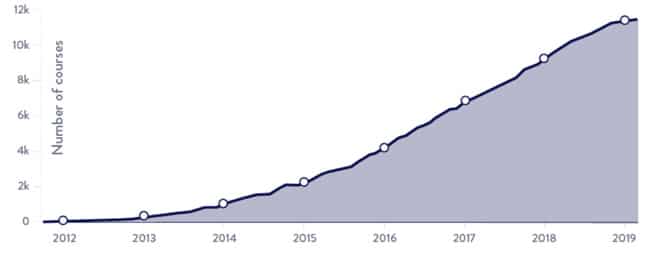The year in MOOCs: Increased revenue and more degrees
The latest annual round-up from Class Central highlights another year of strong growth, but also a sharpening focus among MOOC providers (or “Massive Open Online Courses”) on revenue growth and the expansion of degree programmes.
First, some numbers. Total enrolment passed the 100 million student threshold for the first time last year to reach 101 million learners worldwide. This represents somewhat slower year-over-year growth than was the case in 2017, but still amounts to a brisk 30% increase in total student numbers for 2018.
As of year end, more than 900 universities around the world had roughly 11,400 MOOCs on offer, with about 2,000 new courses added during 2018. Class Central makes the additional, interesting observation that the number of courses continues to grow more quickly than the number of MOOC students and “since user growth hasn’t kept up, each course is getting fewer users.”

Follow the money
Beyond those high-level trends, Class Central reports an increasing focus on revenue growth among major MOOC platforms again last year, driven by growth in user-pay options (including an expanding field of micro credentials and other qualifications), a growing volume of corporate training contracts, and the continuing expansion of full online degree programmes. Commenting on this shift, Class Central CEO Dhawal Shah says, “I remain hopeful that these new business models will act as a safeguard of free content, ensuring its continued availability for those who need it, regardless of their ability to pay. However, one thing is abundantly clear: free users are no longer a focus.” There was indeed a big jump in the number of online degrees offered through MOOC platforms last year. By the end of 2018, 45 full MOOC-based degrees had been announced or launched. This represents a tripling from the 15 full degrees on offer in 2017. But as Class Central also points out, most of these new degrees are at a very early stage and enrolment remains highly concentrated among only a few online programmes. “The first online degrees by Coursera, Udacity, and edX have done well, with combined potential revenue of over $80-million based on numbers of currently enrolled students,” says Mr Shah. “Over 10,000 students are currently enrolled in a MOOC-based degree program. But the bulk of those of enrolled students come from just two universities and three online degrees: the Online Master’s Degree in Computer Science (Georgia Tech with Udacity), the Online Master of Science in Analytics (Georgia Tech with edX), and the iMBA (University of Illinois Urbana Champaign with Coursera).” The overall picture for 2018 is one of a continuing mainstreaming of online learning. The growing reach and impact of major MOOC platforms is one indication of this, but so too are the direct online offerings of a growing number of universities and colleges around the world – and the increasing integration of online learning with on-campus provision for many institutions. For additional background, please see:
Most Recent
-
The surging demand for skills training in a rapidly changing global economy Read More
-
US issues corrected student visa data showing growth for 2024 while current trends point to an enrolment decline for 2025/26 Read More
-
Survey finds US institutions expanding agency engagement and focusing on new student markets Read More


















